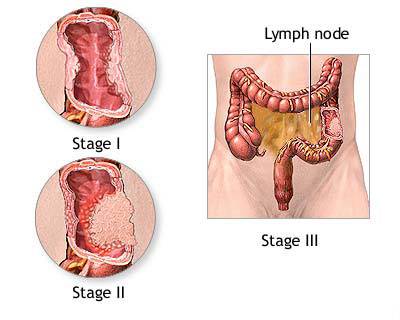| What is Tumor Rectal? |
Tumors can be either benign (non-cancerous) or malignant (cancerous). Most rectal tumors form inside the lining of the rectum. Rectum or rectal is the last six inches of the large intestine, also called the colon. The rectal connect to the anal canal, which leads to the anus which opens to the outside of the body. The location of the rectum and colon are both part of the large intestine, many conditions of either are often referred to as colorectal.

| What is Tumor Rectal Symptom? |
If treated in its earliest stages, rectal tumor is highly curable. If untreated, stray tumor cells can migrate around the body via the lymphatic system and develop secondary tumor. There several symptom of tumor rectal:
- A change in bowel habits.
- Diarrhea, constipation, or feeling that the bowel does not empty completely.
- Blood (either bright red or very dark) in the stool.
- Stools that is narrower than usual.
- General abdominal discomfort (frequent gas pains, bloating, fullness, and/or cramps)
- Weight loss with no known reason
- Constant tiredness
- Vomiting
![]()
TUMOR RECTAL ALTERNATIVE TREATMENT
| What is Tumor Rectal Risk Factor? |
The exactly causes of rectal tumor are not known. However, the following risk factors of rectal tumor increase a person’s chances of developing this disease. There are several risk factor of tumor oral:
- Age
Rectal tumor is more likely to occur after age 50 and the average at diagnosed is in the mid-60.
- Cigarette smoking
People who smoke cigarettes may be at increased risk of developing polyps and colorectal tumor.
- Family Medical History
First relatives (parent, siblings, children) of a person who has had rectal tumor are somewhat likely to develop this type of tumor themselves, especially if the relatives had the tumor at a young age.
- Polyps
Polyps are benign growths on the inner wall of the colon and rectum. It usually occurs in people over age 50. Some types of polyps increase a person’s risk of developing colorectal tumor.
- Personal medical History
The women with a history of tumor of the ovary, uterus, or breast have a somewhat increased chance of developing rectal tumor.
- Ulcerative colitis or Crohn’s disease
The person who has had a condition those cause inflammation of the colon (such as ulcerative colitis or crohn’s disease), for many years is at increased risk of developing colorectal tumor.
 |
Search The Best Treatment for Tumor in Rectal in Google search here |